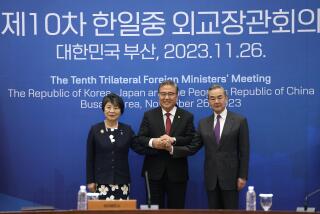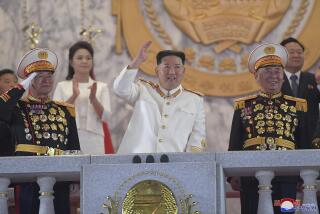North, South Korea agree to hold family reunions
SEOUL -- North and South Korea on Friday agreed to hold reunions of families separated after the Korean War ended in 1953, resuming gatherings that were halted in 2010 amid rising tensions.
Delegates attending day-long discussions in the truce village of Panmunjom confirmed that the family reunions would take place from Sept. 25 to 30 at the Mt. Kumgang resort in North Korea and would include 100 people from each nation. They agreed that video conferences will take place on Oct. 22 and 23, allowing 40 families to see each other over screens.
The two sides also agreed that they would hold more family reunions in November and seek to “fundamentally resolve separate family issues” by holding regular meetings, allowing families to exchange letters and confirm whether relatives are alive or dead.
“This is far more progress than what we had expected,” said Shim Goo-seob, president of an association of separated families. “The best achievement from the talk today is that we have a chance of regularized family reunions and letter exchanges, and also video conference for those who are too old to come to the meetings. “
The negotiations came after South Korean President Park Geun-hye urged North Korea last week to “open its heart” and agree to resume family reunions.
Millions of Koreans were separated by the 38th parallel after the bloody three-year Korean War, which ended in a truce. More than 72,000 people in South Korea have signed up to meet relatives in the North, with more than 80% of the registrants over the age of 70.
With North Korea angered early this year by international sanctions over its nuclear and missile programs, there was little expectation of resuming the family reunions. However, tensions were eased on the peninsula after an agreement last week to reopen the Kaesong industrial complex, which was closed in April.
While Pyongyang’s eased attitude gave hope to the separated families, experts warned that there is no guarantee on the continuity of the family reunions.
“For the past two decades, North Korea has shown a pattern, which is carrying out a nuclear test or launching missiles and then using family reunions or Mt. Kumgang tours as a means of easing the tension,” said Park Syung-je, a North Korea analyst with Seoul-based Asia Strategy Institute. “While Pyongyang was very forward-looking at the meeting today, we should see how it progresses.”
ALSO:
Wife of China’s Bo Xilai testifies in his trial
Portuguese opera singer has a starring role in protests
Gang rape of photojournalist shocks India; 1 arrested, 4 sought
More to Read
Sign up for Essential California
The most important California stories and recommendations in your inbox every morning.
You may occasionally receive promotional content from the Los Angeles Times.










